Films from the country "espagne", sorted by revenue

Abracadabra (2017)
, 1h36Directed by Pablo Berger
Origin Espagne
Genres Comedy, Black comedy
Actors Maribel Verdú, Antonio de la Torre, José Mota, Quim Gutiérrez
Carmen et son mari macho Carlos vivent à Madrid, dans le quartier de Carabanchel. Lors d'un mariage dans la famille de Carmen, Pepe, le cousin de celle-ci, se livre en amateur à une séance d'hypnose. Carlos commence par le railler mais finit possédé par un esprit malin : lui qui délaissait sa femme devient parfait époux. Carmen et Pepe se lancent alors à la recherche de la façon d'expulser le fantôme.

Kika (1993)
, 1h54Directed by Pedro Almodóvar
Origin Espagne
Genres Drama, Comedy
Themes Films about families, Films about sexuality, Erotic films
Actors Verónica Forqué, Peter Coyote, Victoria Abril, Rossy de Palma, Charo López, Bibiana Fernández
Kika (Veronica Forqué), a young, bubbly aspiring actress turned cosmetologist, is called to the cottage of Nicholas Pierce (Peter Coyote), an American freelance writer who has moved to Spain to write about game hunting, to make-up the corpse of his stepson, Ramón (Alex Casanovas), before notifying the authorities. The circumstances of Ramón's "death" are rather suspicious, but Kika does not raise an issue of them and performs her work on Ramón. It turns out that he is not dead, and is actually catatonic. He is revived by Kika's attentions; soon after Ramón tells her the story of his life: he is a lingerie photographer who hasn't coped with the suspicious death of his mother, for which he blames Nicholas (since he was the last person to see her alive, and since he has since read his mother's diary, in which Nicholas is portrayed as abusive). Feeling empathic to Ramón, and in part turned on by the whole experience, she decides to move in with him.
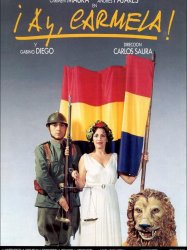
Ay, Carmela! (1990)
, 1h42Directed by Carlos Saura
Origin Espagne
Genres Drama, War, Comedy, Comedy-drama, Historical
Themes Political films
Actors Carmen Maura, Gabino Diego, José Sancho or Pepe Sancho, Edward Żentara, Víctor Manuel Mendoza
Carmela, Paulino, and Gustavete - who is mute as the result of an explosion - are a trio of travelling vaudeville performers. Amidst the chaos of the Spanish Civil War, they are in the town of Montejo, entertaining republican troops with their variety show. They are survivors who are motivated, not exactly by patriotism, but by a desire for self-preservation. Their show consists of four acts. It begins with Carmela singing and dancing a traditional song. The audience is enthusiastic during her performance, but the mood changes completely when the sound of approaching nationalist planes is heard.
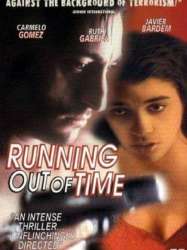
Running Out of Time (1994)
, 1h37Directed by Imanol Uribe
Origin Espagne
Genres Drama, Thriller
Actors Carmelo Gómez, Javier Bardem, Karra Elejalde, Candela Peña, Elvira Mínguez, Mariola Fuentes
Antonio, un terroriste d'ETA, planifie un attentat à Madrid. Il rencontre Charo, une prostituée droguée de 18 ans.
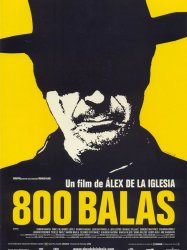
800 Bullets (2002)
, 2h4Directed by Álex de la Iglesia
Origin Espagne
Genres Comedy, Action, Western
Actors Sancho Gracia, Carmen Maura, Luciano Federico, Terele Pávez, Ane Gabarain
Julián Torralba is a former film stuntman in Almeria, Spain. He and several of his colleagues, who once made a living in American Westerns shot in Spain, now are reduced to doing stunt shows for minuscule audiences on the decaying set built for those old Westerns. Julián wrestles with dark memories of the death of his son, also a stuntman, and with estrangement from his daughter-in-law Laura and her son Carlos. Carlos, a young boy, becomes intrigued with his late father's life and runs away to join Julián and his band of has-beens. There Carlos is initiated into the rambunctious life of these hard-drinking faux cowboys. But when Laura, a powerful executive looking for a new site for a tourist resort, learns that Carlos has joined the hated Julián, she moves to destroy even this remnant of Julián's once-proud career. Julián and the cowboys decide to fight back the only way they know how.
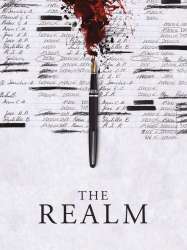
The Realm (2018)
, 2h12Directed by Rodrigo Sorogoyen
Origin Espagne
Genres Drama, Thriller
Actors Antonio de la Torre, Ana Wagener, Bárbara Lennie
Manuel López Vidal est un homme politique influent à l'avenir prometteur. Mais son implication dans une affaire de corruption vient remettre en cause sa réputation. Prêt à tout pour conserver sa place montante au sein de son parti, il va très vite plonger dans une spirale infernale.
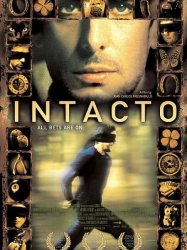
Intact (2001)
, 1h48Directed by Juan Carlos Fresnadillo
Origin Espagne
Genres Drama, Science fiction, Thriller, Comedy, Action, Romance
Actors Leonardo Sbaraglia, Max von Sydow, Guillermo Toledo, Marta Gil
A concentration camp survivor named Samuel Berg (Max von Sydow), a preternaturally lucky fellow, runs a European casino. One of his workers is Federico (Eusebio Poncela), a man who "steals" other people's luck merely by laying a hand on them (a similar concept is used in the 2003 Las Vegas comedy-drama The Cooler).
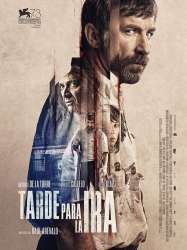
The Fury of a Patient Man (2016)
, 1h32Directed by Raúl Arévalo
Origin Espagne
Genres Thriller
Actors Antonio de la Torre, Ruth Díaz, Berta Hernández
En 2007, à Madrid, un braquage de bijouterie tourne mal. Les trois malfaiteurs qui se trouvent dans le magasin prennent la fuite en courant. Le chauffeur qui les attendait, Curro, est arrêté. Il ne dénonce pas ses complices. Une employée meurt de ses blessures. Le bijoutier reste dans un état végétatif permanent.
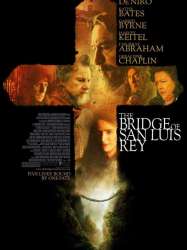
The Bridge of San Luis Rey (2004)
, 2hDirected by Mary McGuckian
Origin Espagne
Genres Drama, Romance
Actors F. Murray Abraham, Kathy Bates, Gabriel Byrne, Geraldine Chaplin, Robert De Niro, Harvey Keitel
The film starts at a public hearing of a council led by Diego de Parada, the Archbishop of Lima (De Niro). Brother Juniper (Byrne) defends his work and his conclusions to the Inquisition, trying to assess whether the people who died were worthy or unworthy of suffering such a tragedy. He analyses the lives of four of the characters and the film flashes back and forth between the hearing and the events that lead to the tragedy.

High Heels (1991)
, 1h53Directed by Pedro Almodóvar
Origin Espagne
Genres Drama, Comedy, Comedy-drama, Crime, Romance
Themes Medical-themed films, Films about sexuality, LGBT-related films, Transgender in film, Films about disabilities, LGBT-related films, Sign-language films, Films about language and translation, LGBT-related film, Cross-dressing in film
Actors Victoria Abril, Féodor Atkine, Marisa Paredes, Miguel Bosé, Anna Lizaran, Cristina Marcos
Rebeca, a TV news broadcaster, is at Madrid's airport anxiously awaiting the return of her mother whom she has not seen since she was a child. Her mother, Becky del Páramo, a famous torch song singer, is coming back to Spain after a fifteen-year stay in Mexico. While waiting, Rebeca recalls incidents from her childhood in which her mother let her in the background of her life preoccupied with her career and her romantic life. For fifteen years Rebeca has longed for her mother to come back and for the love and affection of which she had been deprived. Nevertheless, her love is accompanied by a deep resentment.

A Perfect Day (2015)
, 1h46Directed by Fernando León de Aranoa
Origin Espagne
Genres Drama, War, Comedy, Comedy-drama
Actors Olga Kurylenko, Benicio del Toro, Tim Robbins, Mélanie Thierry, Sergi López, Morten Suurballe
Guerre de Bosnie-Herzégovine, 1995. Un groupe d’humanitaires est en mission dans une zone rurale : Sophie, nouvelle recrue idéaliste, veut absolument aider. Un cadavre a été jeté au fond d'un puits par une faction adverse afin de contaminer l'eau d'un village. Mambru, un homme pragmatique et désabusé, et ses collègues de l'association "Aids Across Borders" entreprennent de remonter le corps tracté par leur 4x4, mais la corde casse.
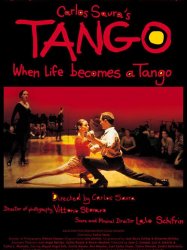
Tango (1998)
, 1h55Directed by Carlos Saura
Origin Espagne
Genres Drama, Musical theatre, Musical, Romance
Themes Dance films, Films about music and musicians, Films about sexuality, Musical films, Tango films, LGBT-related film, Lesbian-related films
Actors Miguel Ángel Solá, Mía Maestro, Juan Luis Galiardo, Cecilia Narova, Enrique Pinti
In Buenos Aires, Mario Suárez, a middle-aged theatre director, is left holed up in his apartment, licking his wounds when his girlfriend (and principal dancer) Laura leaves him. Seeking distraction, he throws himself into his next project, a musical about the tango. One evening, while meeting with his backers, he is introduced to a beautiful young woman, Elena, the girlfriend of his chief investor Angelo, a shady businessman with underworld connections. Angelo asks Mario to audition Elena. He does so and is immediately captivated by her. Eventually, he takes her out of the chorus and gives her a leading role. An affair develops between them, but the possessive Angelo has her followed, and threatens her with dire consequences if she leaves him, mirroring Mario's own feelings and actions towards Laura before Elena entered his life.
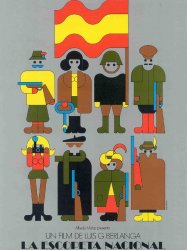
The National Shotgun (1978)
, 1h35Directed by Luis García Berlanga
Origin Espagne
Genres Comedy
Actors Rafael Alonso, José Sazatornil, Antonio Ferrandis, Conchita Montes, José Luis López Vázquez, Mónica Randall
Un industriel catalan organise une partie de chasse mondaine afin de promouvoir ses ambitions commerciales. Mais il doit surmonter de nombreuses difficultés avec ses invités. En outre, les politiciens corrompus sur lesquels ils comptaient seront évincés lors d'un remaniement ministériel. Un tableau satirique des classes au pouvoir dans les dernières années du franquisme...
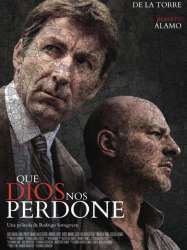
May God Save Us (2016)
, 2h7Directed by Rodrigo Sorogoyen
Origin Espagne
Genres Drama, Thriller, Action, Crime
Themes Serial killer films
Actors Antonio de la Torre, Javier Pereira, José Luis García Pérez, Alfonso Bassave, María Ballesteros, Estefanía de los Santos
Été 2011. Alors que Madrid est le cœur du mouvement des Indignés et s'apprête à recevoir la visite de Benoît XVI à l'occasion des Journées mondiales de la jeunesse, deux inspecteurs de police traquent un tueur en série. Il s'attaque aux vieille dames seules qu'il viole et tue sauvagement chez elles. Les deux inspecteurs sont très différents, Javier Alfaro est un homme violent et direct, et est impliqué dans plusieurs incidents avec ses collègues qui le mettent en difficulté avec ses supérieurs. Luis Velarde, au contraire, est un cérébral méticuleux qui, en plus, est bègue et peu à l'aise dans sa vie personnelle.
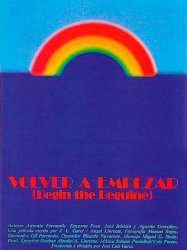
To Begin Again (1982)
, 1h27Directed by José Luis Garci
Origin Espagne
Genres Drama, Romance
Actors Antonio Ferrandis, Agustín González, Encarna Paso, José Bódalo
It is the year 1981, the famous writer Antonio Albajara (Antonio Ferrandis) arrives at Gijón, his hometown, from Stockholm, where he has just received the Nobel Prize in Literature. For forty years, Albajara has been a professor of medieval literature at the University of Berkeley, California. He has alternated his teaching with the literary production that has given him worldwide fame. In Gijón, Antonio is reunited with Elena, his first and great love, before he was forced to his exile in 1937 Civil War. However, this visit is not definitive because a serious and deadly disease affects the writer.
 Connection
Connection